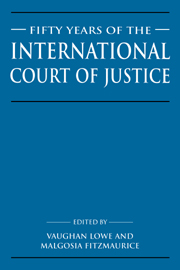Book contents
- Frontmatter
- Contents
- List of contributors
- Preface
- List of abbreviations
- Sir Robert Yewdall Jennings, by Vaughan Lowe
- List of publications of Sir Robert Jennings
- Table of cases
- Part I The International Court of Justice
- Part II The sources and evidences of international law
- 4 The International Court of Justice and the sources of international law
- 5 Municipal law reasoning in international law
- 6 Estoppel and acquiescence
- 7 L'Equité dans la jurisprudence de la Cour Internationale de Justice
- 8 The International Court of Justice and the law of treaties
- 9 International ‘soft law’: a contemporary assessment
- Part III Substance of international law
- Part IV Procedural aspects of the work of the International Court of Justice
- Part V The International Court of Justice and the United Nations
- Index
4 - The International Court of Justice and the sources of international law
Published online by Cambridge University Press: 02 November 2009
- Frontmatter
- Contents
- List of contributors
- Preface
- List of abbreviations
- Sir Robert Yewdall Jennings, by Vaughan Lowe
- List of publications of Sir Robert Jennings
- Table of cases
- Part I The International Court of Justice
- Part II The sources and evidences of international law
- 4 The International Court of Justice and the sources of international law
- 5 Municipal law reasoning in international law
- 6 Estoppel and acquiescence
- 7 L'Equité dans la jurisprudence de la Cour Internationale de Justice
- 8 The International Court of Justice and the law of treaties
- 9 International ‘soft law’: a contemporary assessment
- Part III Substance of international law
- Part IV Procedural aspects of the work of the International Court of Justice
- Part V The International Court of Justice and the United Nations
- Index
Summary
It is a particular pleasure to contribute an essay on the sources of international law to this Festschrift for Sir Robert Jennings in recognition, not only of his distinguished contributions to this topic both as an academic and as a judge, but also of personal acts of kindness.
Every case in the World Court involves the sources of international law in some form, because every case requires an investigation of substantive or adjective rules whose existence and legal effect ultimately depends on their having been created by one of the means recognized as apt for this purpose. Even if one eliminates cases where there was no issue as to the status of the rule, but only as to its content, in the fifty years since the International Court of Justice was established it has had very many occasions to make rulings pertinent to our topic. In the space available here, any review of its contribution is inevitably summary and impressionistic.
The ICJ has not attempted to elaborate a theory of the sources of international law or attempted to catalogue them. This is hardly surprising: its function is to decide the particular disputes before it, not to elaborate general theories or to decide questions that are not in issue.
- Type
- Chapter
- Information
- Fifty Years of the International Court of JusticeEssays in Honour of Sir Robert Jennings, pp. 63 - 89Publisher: Cambridge University PressPrint publication year: 1996
- 8
- Cited by



